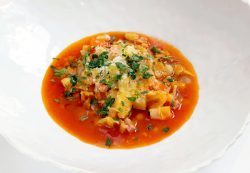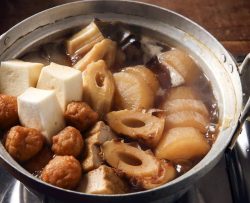Japanese Alcohol Shoots for Overseas Market; Domestic Manufacturers Change Tactics, Develop New Products to Make a Splash Abroad
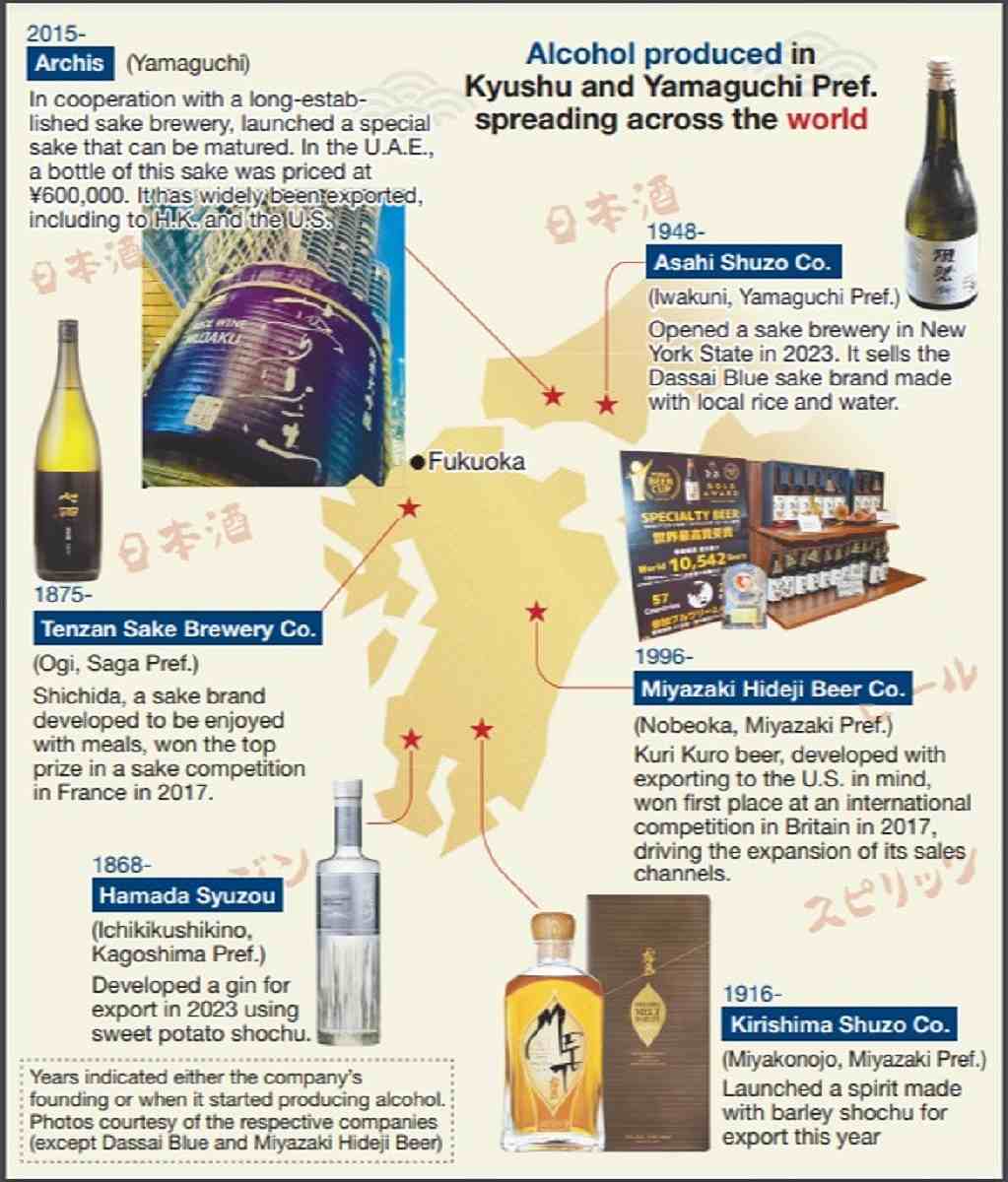
12:00 JST, November 17, 2024
Manufacturers of sake, shochu and other alcoholic beverages are stepping up their overseas business expansion. Through promoting value-added products and developing new ones for consumers overseas, companies are seeking to tackle a declining Japanese population and consumers’ diversifying needs shrinking the domestic market.
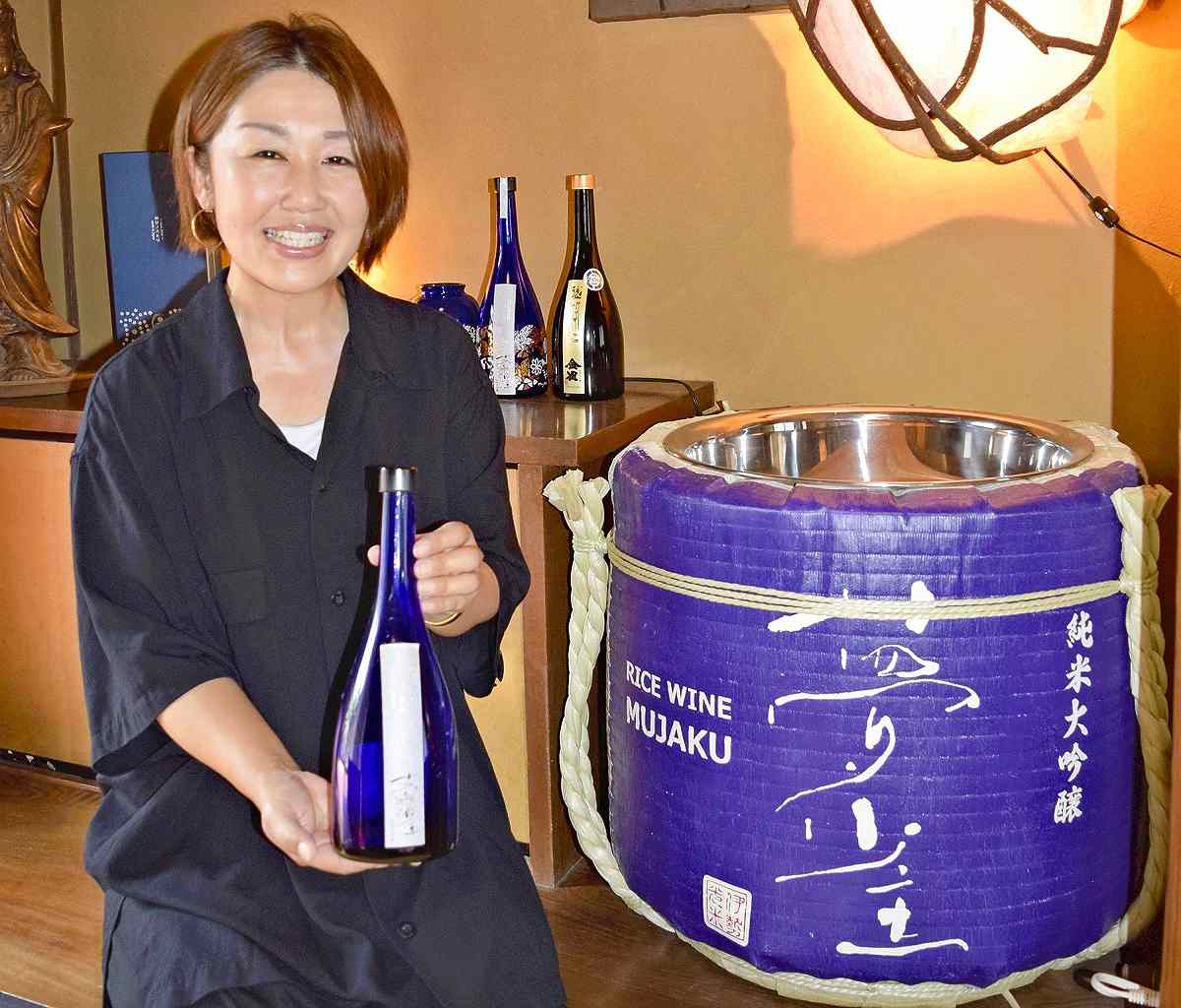
Archis President Natsuko Matsuura is seen in Yamaguchi on Sept. 20.
“I was able to do something new from a fresh perspective because I didn’t originally work in the sake industry,” said Natsuko Matsuura, 43, president of Yamaguchi-based trading company Archis, smiling as she holds a bottle of Mujaku, a junmai daiginjo sake sold in Japan and overseas.
Junmai daiginjo is a premium sake made from highly polished rice without adding distilled alcohol.
A native of Yamaguchi Prefecture, Matsuura had the idea of boosting the local alcohol manufacturing industry by creating a special sake that can mature like wine, which is unusual as sake is not normally aged. She sought the cooperation of Horie Brewing Co. in Iwakuni in the prefecture, the prefecture’s oldest sake brewery, founded in 1764.
The brewery started the new sake project using Isehikari sake rice grown by farmers in the prefecture and spring water in Iwakuni. The sake Mujaku was completed in 2016.
In a joint effort, the sake was brought to a Japanese restaurant in Dubai’s luxurious Armani Hotel, where it was highly praised by the sommelier and priced at about ¥600,000 per bottle. In Japan, the sake’s highest selling price this year exceeded ¥1 million.
The sake’s sales channel has expanded overseas, including to the United States and Britain.
Matsuura is considering further expansion. “I want to have Mujaku be more known across the world and eventually help add more value to Japanese sake,” she said.
Highest award
In the Kyushu region and Yamaguchi Prefecture, many companies were founded as alcohol manufacturers or started manufacturing alcohol in the Edo period (1603-1867) and the Meiji era (1868-1912).
Asahi Shuzo Co. in Iwakuni, known for its Dassai brand, was founded in 1948 as a corporate body, but its alcohol manufacturing business started in the late 1700s during the Edo period.
Overseas expansion is a new challenge for Japan manufacturers, driven by the country’s declining child population and an aging society, together with young people increasingly consuming less alcohol.
Total alcohol consumption in Japan was 7.82 million kiloliters in fiscal 2022, a decline of about 10% from 10 years before, the National Tax Agency has reported.
Tenzan Sake Brewery Co. in Ogi, Saga Prefecture, started manufacturing alcohol in 1875. The company already gets more than 10% of its sales from abroad. Around 20 years ago, it launched a new brand of sake, Shichida, with the aim of exporting it. The sake won the top prize in 2017 in a sake competition originating in France that same year, expanding the company’s overseas business as a result.
Company president Kensuke Shichida, 53, said, “The overseas market has huge potential for growth. I want to increase our overseas sales ratio to about 30% in the next five years.”
Sake is not the only Japanese alcohol embraced overseas.
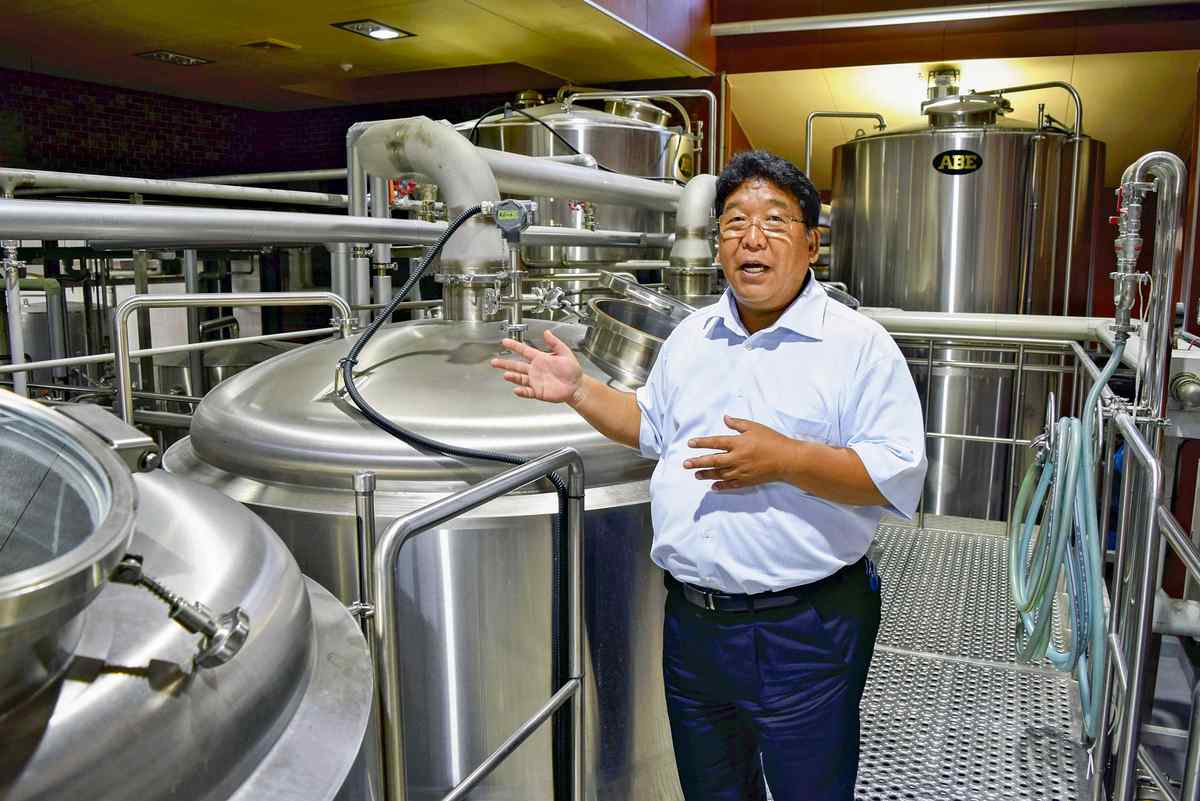
Miyazaki Hideji Beer President Tokihiko Nagano speaks of his enthusiasm for expanding sales channels in Nobeoka, Miyazaki Prefecture, on Sept. 25.
Miyazaki Hideji Beer Co. in Nobeoka, Miyazaki Prefecture, which entered the beer industry in 1996, won first place in an international beer competition in Britain in 2017 for its Kuri Kuro, a black beer featuring chestnuts as an auxiliary ingredient. Due to growing demand both in Japan and overseas, the company doubled its production capacity in 2022.
President Tokihiko Nagano, 56, said: “Securing sales channels overseas is helpful to stabilize our business. It works especially when the sales landscape changes in Japan.”
Increasing profile
According to the Finance Ministry trade statistics, the total export value of alcoholic beverages from Japan in 2022 was ¥139.1 billion, an increase of more than five times over the past decade.
However, there are wide discrepancies. While whisky and sake account for about 70% of the total, shochu only accounts for about 1%. It is believed distributing shochu abroad is difficult as drinking distilled spirits, including shochu, during mealtime is very rare overseas, and shochu itself is much lesser known.
To raise shochu’s profile, manufacturers have turned their attention to gin, a well-known distilled spirit with a similar production process.
Hamada Syuzou, a long-established company in Ichikikushikino, Kagoshima Prefecture, developed and produced a gin exclusively for overseas consumption, using its mainstay potato shochu as the base and adding the locally produced sour pomelo, a citrus fruit.
Last year, the company began marketing the product to Europe, the United States and China.
The company’s ultimate goal is to “cultivate interest in shochu among overseas consumers by using the gin as a starter,” while aiming to develop sales channels in local bars and other establishments, an official says.
Top Articles in Features
-

Tokyo’s New Record-Breaking Fountain Named ‘Tokyo Aqua Symphony’
-

Sapporo Snow Festival Opens with 210 Snow and Ice Sculptures at 3 Venues in Hokkaido, Features Huge Dogu
-

Tourists Flock to Ice Dome Lodge at Resort in Hokkaido, Japan; Facility Invites Visitors to Sleep on Beds Made of Ice
-

High-Hydration Bread on the Rise, Seeing Increase in Specialty Shops, Recipe Searches
-

Heirs to Kyoto Talent: Craftsman Works to Keep Tradition of ‘Kinran’ Brocade Alive Through Initiatives, New Creations
JN ACCESS RANKING
-

Japan PM Takaichi’s Cabinet Resigns en Masse
-

Japan Institute to Use Domestic Commercial Optical Lattice Clock to Set Japan Standard Time
-

Israeli Ambassador to Japan Speaks about Japan’s Role in the Reconstruction of Gaza
-

Man Infected with Measles Reportedly Dined at Restaurant in Tokyo Station
-

Videos Plagiarized, Reposted with False Subtitles Claiming ‘Ryukyu Belongs to China’; Anti-China False Information Also Posted in Japan


